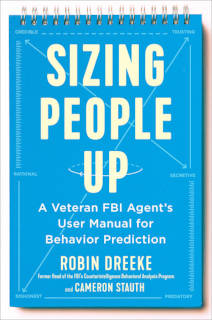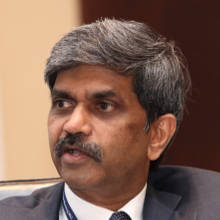Sizing People Up: A Veteran FBI Agent’s User Manual for Behavior Prediction
By Robin Dreeke and Cameron Stauth
Predicting behaviour isn’t rocket science, say Robin Dreeke and Cameron Stauth in their book, ‘Sizing People Up’. It is a social science, and requires you to apply the right equation of logic, strategy, scepticism, observational skills, and the ability to accept unwelcome truths
D ShivakumarBy Robin Dreeke and Cameron Stauth

Robin Dreeke is former head of FBI’s counterintelligence behaviour analysis programme.
Cameron Stauth has written 26 books. He was editor in chief for three magazines.
2 of 45
Few of the most serious problems in life are as common as not being able to read people accurately and predict what they will do.
3 of 45
Even good people feel the need to hide things, because nobody’s perfect and everybody’s vulnerable. A high percentage of people break rules and lie when they are desperate.
4 of 45
Decent, moral people also shade the truth because each of us wants to be loved, and sometimes we’re afraid that our true selves aren’t worth it.
5 of 45
People hide the whole truth for reasons that are far darker—such as greed, manipulation, power, control and deception. It’s particularly likely when people rise to positions of power, even if it’s a petty form of power.
6 of 45
Trust is a lofty value. Trust is the active form of faith. It demonstrates in real time and in the real world, a belief that people will not only try to do what they say they will, but also have the competence and diligence to make it happen.
7 of 45
To function effectively, humans must be able to predict what the others will do, and trust them accordingly. But, if you hand your trust like candy, you can lose the things you treasure most.
8 of 45
When you are sizing people up, you learn a lot about their character, traits, tendencies, desires, affections, strengths, weaknesses, but all that feeds into the single most important attribute that you’re invariably looking for: trustworthiness.
9 of 45
The one thing you can almost always predict is for people to act in their own best interests.
10 of 45
Trust, therefore, is not a matter of morality; trust is a predictability.
11 of 45
Predicting behaviour isn’t rocket science, but it is a social science, and requires you to apply the right equation of logic, strategy, scepticism, observational skills, and the ability to accept unwelcome truths.
12 of 45
To find out if someone is a good ally, talk to them about their immediate goals, necessities, concerns and passions, and see if they fit with yours. The urge for partnership is a primal need.
13 of 45
Unreliable and unpredictable people often try to say the right things with the right words, but are usually exposed by subtle signs of the disconnect between their words and actions.
14 of 45
Effective communicators ask a lot of questions, are easy to understand, don’t try to manipulate, and are always looking for ways to connect.
15 of 45
When you are sizing up people, your greatest sources of information will be through conversation. Conversation tells, speech tells, non-verbal tells from the rest of the body, and factual information.
16 of 45
The reality is, very few people are looking to hurt you. They are just trying to take care of themselves and their families as you are—so it’s against your best interests to judge them for that.
17 of 45
10 negative tells to watch for
18 of 45
I’ve also found that as a rule, the farther people go back into their lives, the more they lower their shields.
19 of 45
Trust and affiliation must be offered in their full context. That’s one of the toughest demands of maintaining a personal relationship in a business situation, since business situations change far more often than people do.
20 of 45
A good boss is totally mission oriented. He is reliable at whatever he chooses to do, because his personality is about competence and diligence.
21 of 45
One of the most ironic ingredients of power is that it grows faster when you let it go.
22 of 45
Reliability is synonymous with trust. But don’t overlook the need for both competence and diligence.
23 of 45
There is also a classic, unchanged factor at play—the so called ‘curse of competence’. Some people are actually punished for their competence, because less competent workers sabotage their success or dump their own work on them.
24 of 45
Competence should be a quality to be judged rationally but has become qualitative because of antiquated techniques of judging it.
25 of 45
Even though lack of competence is a deal breaker in most issues of trust, competence without diligence can be more insidious because it will catch you off guard.
26 of 45
Diligence is one of our primary rudders. It guides us through days of doubt, it course-corrects when we go off track, and it contributes tremendously to the predictability that reliability creates and reflects.
27 of 45
Diligent people work without drama, don’t play politics, don’t get into last minute glitches and don’t shirk responsibility.
28 of 45
The primary driver of character-driven people is not financial, it is sincere, consistent respect.
29 of 45
10 negative tells for reliability: Unreliable people
30 of 45
10 positive tells for reliability: Reliable people
31 of 45
The hardest element to isolate is the awkward intersection of thought and emotion. Human beings are often dreamy and call it optimism, or too fearful and call it prudence.
32 of 45
The changes that affect character most are threats and temptations, which sometimes occur simultaneously.
We see this happen in politics and business. This is the power paradox.
33 of 45
A history of honesty is usually considered one of the most valuable indicators of strong character and trustworthiness. Watch out because many business executives are adept at telling the truth but rarely the full truth.
34 of 45
People often wield the tool of integrity to attack people they oppose.
35 of 45
In meetings, company guys usually remain silent but are gung-ho when the boss gives the go.
36 of 45
It’s hard to robustly trust anyone who has direct power over you, because too much is at stake to be complacent about it.
37 of 45
Humility is one of the things all of us want, but don’t always like it.
38 of 45
Fear is necessary to survive, and love is necessary to thrive. The same cannot be said of any other emotion.
39 of 45
Love in the broadest sense must be present for trust.
Trusting and liking are not at all synonymous, but in all cases, they are simultaneously present, simply because you cannot trust someone if you don’t like them.
40 of 45
Emotional stability exists on a continuum and most people are adequately stable, while others have abundant emotional stability.
41 of 45
10 negative tells about emotional stability
42 of 45
10 positive tells about emotional stability
43 of 45
Life rarely travels in a straight, unbroken line. Life unfurls at abrupt right angles created by choices we make, to trust or doubt, to accept or reject. These are the moments that define us.
44 of 45
With logic, discipline, and information, you can spot flakes and phonies, defy the forces of manipulation, and get to the bottom of complex situations.
45 of 45
By Robin Dreeke and Cameron Stauth
Was this article useful? Sign up for our daily newsletter below
About the author

Shivakumar is Operating Partner at Advent International. Before this, he was President (Corporate Strategy and Business Development) at Aditya Birla Group. Earlier assignments include: Chairman & CEO at Pepsico India and prior to that, Managing Director at Nokia India. Before joining Nokia, he worked with consumer electronics maker Philips and top consumer goods firm Hindustan Unilever. He is an engineer from IIT Chennai and an MBA from IIM Calcutta.
Shivakumar has written three books: Reflections - a collection of Shivs articles; The Right Choice - Resolving Ten Career Dilemmas; and The Art of Management. The latter two are business bestsellers.
Also by me
Trending